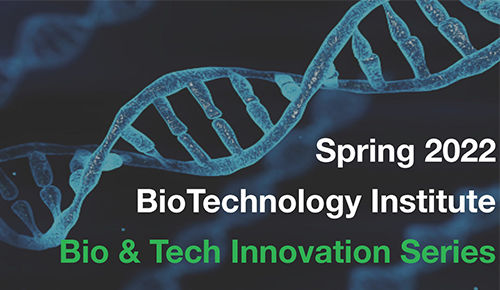
Building New Metabolic Pathways
By Kevin Coss
Microbes are nothing if not industrious. The metabolic pathways (linked series of chemical reactions) in these tiny organisms lead them to crank out a wide variety of molecules for all sorts of purposes — and that’s what has Mike Freeman’s attention.
“Some of these pathways are for chemical communication, some are for warfare, and others are completely unknown to us,” says Freeman, Ph.D., member of the University of Minnesota BioTechnology Institute and assistant professor of biochemistry, molecular biology, and biophysics. “A large part of what our lab does is looking at those genes and those pathways in unique organisms and studying them for the purpose of both basic science and biotechnology.”
Freeman’s research involves understanding how each piece of a biological system works and then combining and mixing those parts to “recircuit” pathways. This field, synthetic biology, aims to redirect microbes’ natural industriousness to produce a different, more desirable product. The intended purpose can span a wide range of applications, from producing compounds that help address bacteria’s growing resistance to antibiotics to developing molecules for use in the fragrance industry.
“You could use a microbe to do something it doesn’t already do in nature, for example, or engineer it to do it much better,” Freeman says. “We’re trying to put things together in unique ways to do what humans want, not what nature wants.”
Understanding the full scope of how a given pathway works, what it produces, and what larger purpose it serves requires a wealth of expertise. Fortunately, Freeman is part of the Synthetic Biology Research Cluster, which brings together faculty, postdoctoral fellows, staff, and students who study in the field to intermingle and learn from one another. This arrangement helps to spark collaborations that inspire new lines of research and enables the group to apply for larger grants with multiple principal investigators.
Freeman’s current research focus is on modifications that give molecules called peptides (smaller versions of proteins, with fewer pieces acting as “links” in their chain) more desirable properties. Peptide-based medications, such as the insulin used to treat diabetes, generally can’t be taken orally because stomach acids destroy the active compounds before they can provide any benefit. Modifying these peptides to remain stable through the digestive tract would open the possibility for peptide-based drugs to be taken as a pill — an option that makes it easier and more comfortable for patients to adhere to their medication schedule.
As another example, Freeman and his team are studying anti-cancer compounds derived from a specific type of fungus. Two promising varieties of peptides had previously been isolated from it, but the team went further in depth to study and isolate other “flavors” of these peptides with unique and useful characteristics. By optimizing the growing conditions in the lab for the fungi’s mycelia — the long, stringlike filaments that spread through the soil — they have been able to isolate a number of compounds from this fungus.
Apart from the medical field, a stronger understanding of synthetic biology could also help solve problems in manufacturing, agriculture, and other industries. While these solutions are appealing, what inspires Freeman the most about his research is the basic science — specifically, how much of it remains undiscovered.
In many other areas of science, researchers build upon a strong foundation of existing knowledge. Synthetic biology is different. It’s only recently that advances in genomic technology made it possible to study the workings and purposes of genes, proteins, and pathways at this level of detail.
“In some cases, the enzymes that we find, the pathways, the molecules have never been seen before in science,” he says. “Being able to explore these unknowns and add to the general scientific knowledge for humanity is what’s really satisfying to me.”





